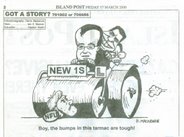Withdrawal of BP Fuel Cards
Many employers in the Scottish islands are facing a massive threat when an oil giant withdraws a vital fuel discount.So far, so reasonable and you can see why the hauliers are up in arms.
Island businesses warn around 20 jobs could go in the Western Isles as BP bans the use of its discount card - which provides fuel at 7.5 pence a litre cheaper - at some independent filling stations in the islands.
The islands affected are Lewis, Shetland, Skye and Arran where filling stations are not run under the BP brand. The discount stops in four weeks and some island firms say their costs will soar by up to £30,000 annually as a direct result.
It could cost the economy of the Outer Hebrides half a million pounds it is said.Whooaa! That doesn't seem right.....
This is a very serious matter which deserves serious consideration, but let's try and get the numbers right and substantiated.
- Assume that the hauliers fill up on the mainland any lorries that are running across the Minch
- The hauliers use a mix of large lorries and small vans
- The discount is only available to the larger businesses, so the smallest hauliers are excluded
- 7.5p a litre costing £500,000 to the economy, equates to 6.7m litres
- As I can't do the modern stuff, that's about 1.46m gallons
- With the mix of vehicles, an average mpg of 10 is probably on the low side, but that gives us 14.65m miles pa
- I estimate that the three big hauliers in Stornoway have perhaps 20-25 vehicles on the go on the islands at any time
- Add on other businesses that may qualify and I estimate perhaps 50 lorries are on the go at any time (Full Time Equivalent)
- That implies each lorry travels 293,000 miles per annum
- Or 5,635 miles a week
- Or 940 miles per day (6 days a week)
- At an average speed of 20mph (town deliveries, starting and stopping etc.) that means that they are operating about 47 hours per day, which is good going by any reckoning, but must play havoc with the tachograph.
50 lorries/vans working full time 10 hours a day at an average speed of 15mph, getting 15mpg, five and half days a week, 52 weeks per annum = 143,000 gallons per annum. That's about 650,650 litres, which at an additional cost of 7.5p per litre gives an additional cost of £48,800 per annum. Even allowing for a huge error in my assumptions, it looks like £100,000 is a more accurate top line figure.
Unless you know different.
Sorry about being a pedant, but I do like numbers.







4 comments:
I run two vans and a diesel car (down from 3 vans because of lack of work, but thats another story) and I have had a discount card for fuel for over ten years.
Present price 93p/l plus vat, £1.07/litre, saving today of 11p/litre.
This equates to £60/ month, say £20 per vehicle per month- and we are town based for 90% of work. A high mileage vehile can easily treble my figures. Multiply by the number of vans you see passing on Monday- (or sitting in the q at Manor) add in the other islands affected, numbers to the accountant..
As a matter of interest has the price of deliveries gone down since RET (ish) was intoduced? Or was that just for cars and not lorries.
Good figures for a delivering goods van, but what about buses (sorry to take us back to previous posts!)
Bus and taxi operators HAVE to fuel on the islands. They are on the go constantly (up to 15 hours per day) as drivers change and vehicles are handed over. They stop only briefly (very briefly, in the case of the buses that stop outside my house, but that's another subject).
I'm rubbish at maths, but I think that these new variables skew the result significantly to the detriment of users. And although the newer types of fuel cards are reserved for larger businesses, a few years ago BP gave them to just about anyone who applied and who had a commercial vehicle.
So the bus companies have yet another legitimate grievance.
8.20pm
Golly gosh, how refreshing to find such a naive question in the cynical times of today.
Post a Comment